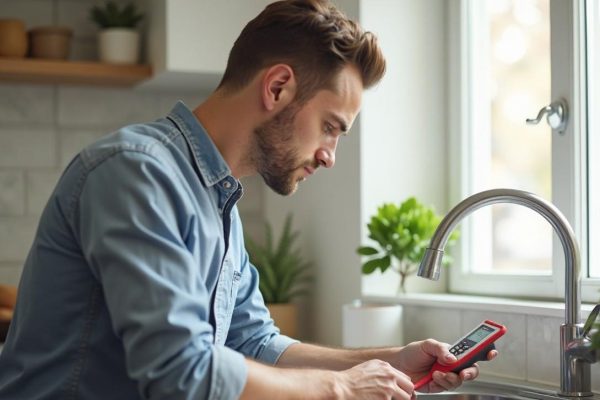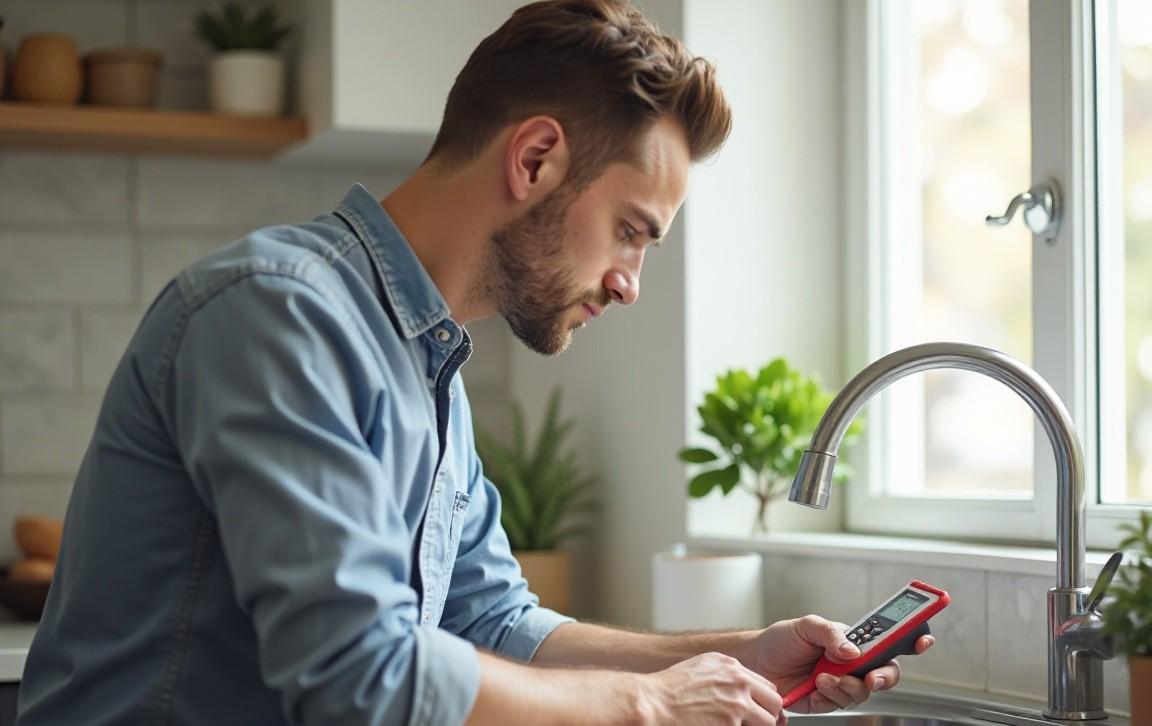Most water damage problems are preventable by regularly inspecting your plumbing, maintaining appliances, protecting your home’s structure, and responding quickly to any signs of leaks or overflow.
If you’re unsure where to start or need help fixing a problem, call Tip Top Plumbing & Restoration at 954-289-3110. Our plumbers are available in Pembroke Pines, FL, and nearby areas.
1. Inspect and Maintain Your Plumbing Systems
Regularly inspect your plumbing system and identify worn parts, minor leaking, or pressure issues to prevent water damage and the risk of major repairs later.
Inspect pipes, faucets, and hose bibs for corrosion, drips, or loose fittings. Pay special attention to areas under sinks, behind toilets, and near the water heater. A slow leak from a faucet or pipe joint may seem minor, but it can lead to mold or structural damage over time.
Monitor your water pressure using a gauge. High pressure can strain your plumbing system and increase the risk of burst lines. Most homes should maintain water pressure between 40 and 60 psi. Install a pressure-reducing regulator if your water pressure exceeds 60 psi.
2. Check for Active Leaks
Look out for leaks that can cause hidden water damage inside walls, ceilings, or under floors. Identifying them early reduces the risk of long-term structural issues and mold.
Check your home for puddles, rust, or discoloration around dishwashers, washing machines, and other appliances. Additionally, inspect the ceiling for water spots or peeling paint and the flooring for warping or swelling.
You can also use a water meter to detect leaks. Turn off all water in the home and check if the meter is still running. If it is, there’s likely a hidden leak.
3. Maintain Your Roof and Gutters
Inspect your roof regularly for cracked, missing, or curled shingles that can allow rainwater to seep inside. Keep gutters and downspouts free of debris to ensure proper water flow away from your home’s foundation.
Clogged gutters filled with leaves and debris can block water flow and cause overflow, leading to pooling near exterior walls. Make sure the gutters are clean to avoid overflow.
Check that downspouts extend far enough from the house, ideally at least 3 to 4 feet, to direct rainwater away from the foundation. This helps prevent basement flooding and soil erosion around your home.
After storms, always inspect the roof and gutters for any new damage or blockages. Promptly repair damaged shingles or clear clogged gutters to maintain proper drainage.
4. Prevent Overflow from Plumbing Fixtures
Overflow typically happens due to clogged drains, faulty faucets, or blockedwater lines. Prevent the problem by keeping drains clear of debris and other materials that can cause blockages.
Regularly inspect drain openings for buildup and use strainers to catch hair and other particles. Fix dripping faucets promptly and ensure drain lines are free from corrosion or damage that could restrict water flow.
For toilets and sinks, avoid flushing or pouring substances that harden or clog the drains. If overflow happens despite precautions, shut off the water supply immediately and call a local plumber for repairs.
5. Protect Your Foundation
Water pooling near your home’s exterior can cause foundation cracks, soil erosion, and basement flooding. To protect your foundation, ensure proper drainage by grading the soil away from the house so water flows downhill.
Inspect exterior walls for cracks or gaps where water might enter and seal them promptly. Check outside downspouts to confirm they direct water at least 3 to 4 feet away from the foundation. Consider installing a French drain or drainage system if water accumulates near your home.

6. Check Indoor Appliances Regularly
Examine the hoses and connections of washing machines, water heaters, and dishwashers for signs of wear that may cause leaking or flooding. Replace any damaged parts promptly to avoid overflow or pipe bursts.
Ensure water supply valves connected to appliances function properly and can be shut off quickly in case of emergency. Look for moisture buildup around appliances, which may indicate slow dripping that could lead to mold or damage.
7. Inspect Exterior Water Systems and Structures
Regularly check outdoor faucets, irrigation pipes, and hose connections for dripping or corrosion that could damage your home’s exterior or cause soil erosion. Look for cracks on the outside walls or foundations where water may enter and seal any gaps to prevent moisture intrusion.
Ensure drains around the house direct water away to avoid pooling near the foundation. Monitor valves and pipes exposed to the elements for signs of wear or damage caused by weather conditions.
8. Monitor Indoor Humidity and Ventilation
Excess indoor moisture can cause water damage by creating a humid environment that promotes mold growth and deteriorates building materials. To remove steam and moisture, use exhaust fans in bathrooms, kitchens, and laundry areas.
You can also use a dehumidifier to maintain balanced humidity levels, especially in basements or poorly ventilated areas. Aim to keep indoor humidity between 30% and 50% to prevent condensation on windows and walls.
9. Prepare for Harsh Weather Events
Protect your home from water damage during storms or hurricanes by inspecting your property for cracks, installing sump pumps in basements, and covering windows with plywood or storm shutters. Severe weather can overwhelm gutters, flood basements, and cause structural damage if you’re not prepared.
Pembroke Pines, Florida, is prone to heavy rainfall, tropical storms, and hurricanes. Before the storm season, inspect your roof for damaged or missing shingles, clean out gutters and downspouts, and ensure they direct water away from your foundation. Seal any cracks around doors, windows, or exterior walls to prevent water intrusion.
Install and test a sump pump so it is ready to handle heavy rains, especially in low-lying areas or basements. Trim overhanging branches, secure outdoor items, and consider using storm shutters or plywood to protect windows from high winds and flying debris.
10. Maintain Pipes in All Seasons
Seasonal changes can cause pipes to freeze during winter and deteriorate in summer. Inspect them regularly to prevent corrosion and bursting.
In the colder months, insulate the pipes, especially in garages, attics, or exterior walls, to prevent freezing or bursting. Disconnect garden hoses and shut off outdoor faucets to protect them from freeze damage. Keep cabinet doors open under sinks to allow warm air to circulate around the drain lines.
During warmer months in Pembroke Pines, Florida, check the pipeline for signs of sun exposure, rust, or expansion from heat. UV rays and high humidity can degrade pipe materials and connections. Inspect irrigation lines, pool plumbing, and outdoor fixtures for cracks or wear, and repair any damage promptly.
11. Install Smart Home Water Detection Devices
Install smart leak detectors near appliances, water heaters, toilets, and under sinks to get alerts about drips and water problems. These devices use sensors to detect moisture and send real-time alerts to your phone, allowing you to act quickly, whether you are home or away.
These systems are especially useful for second homes or rental properties where damage might go unnoticed for days. For enhanced protection, connect your leak detectors to a water shut-off valve, which can automatically stop the flow of water when a leak is detected.
12. Know Where Your Water Shut-Off Valve Is
Understand the exact location of your home’s water shut-off valve to stop flooding and minimize water damage in an emergency. In most homes, the valve is located near to the main water line, often in the garage, utility room, or along an outside wall.
Label the shut-off valve clearly and make sure all household members know how to turn it off. For added preparedness, test the faucet every few months to ensure it turns smoothly and isn’t stuck from corrosion.
Some homes also have individual shut-offs for toilets, sinks, and appliances. Familiarize yourself with these locations as well.
We Help Prevent Water Damage with Expert Solutions and Fast Service
At Tip Top Plumbing & Restoration, we help homeowners prevent water damage by addressing the early signs before they become costly problems. Our expert team offers fast, reliable service – 24 hours a day to protect your home.
If you notice any signs of water damage or need assistance, we’re ready to help anytime.
Call 954-289-3110 now for inspection and service.
FAQs
What should homeowners do if their toilet keeps overflowing or backing up?
Frequent backups may signal a larger issue in the line or drainage system. To prevent water damage, avoid DIY fixes for recurring problems and call a professional plumber near you.
What are the most common signs of water damage that homeowners should watch for?
Look for musty smells, stained walls, or warped flooring. Address them quickly to reduce costly repairs and prevent further leaking.
Can heavy rain cause damage to a house even if the roof looks fine?
Rain can enter through foundation cracks, clogged gutters, or poorly sealed windows. To catch issues early, homeowners should check for damp areas following storms.
How can a water heater contribute to water damage?
A leaky water heater or one with a failing valve can eventually cause indoor flooding. Regular inspections can help homeowners catch problems before they escalate.
Do I need flood insurance if I already have homeowners coverage in Pembroke Pines FL?
Standard homeowners insurance often doesn’t cover flood-related damage. Consider adding flood insurance if your house is in a high-risk zone or prone to backups.
Is it safe to try a DIY fix for minor leaks?
DIY repairs might work temporarily, but they often miss the root cause. It’s best to get a professional to help prevent ongoing water damage.

